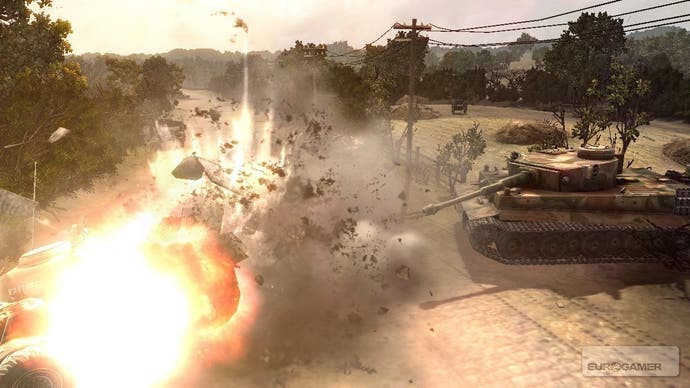Company of Heroes: Tales of Valor
Anything left in the tank?
The winds of change blowing through the corridors of Relic Entertainment may be having the most profound impact on the Dawn of War team, but there's still enough of a breeze left to sway the direction of its other projects, and the Canadian developer deserves credit for its efforts to chop, change and experiment - even with a critical darling widely regarded as one of the greatest strategy games ever made. Company of Heroes: Tales of Valor is the second standalone expansion to the gripping WWII RTS, but more of the same just wouldn't do, and Relic simply can't stand still.
Everyone's banging on about making real-time strategy more "accessible" these days. A noble mission, for sure, and solutions differ. On console - clearly a very different proposition to PC and hostile territory for strategy developers - Ubisoft is the latest to have a crack with EndWar, ditching micro-management and trying to solve the interface problem with voice command. We mention EndWar because creative lead, Michael de Plater, a veteran of the Total War series, took a specific pop at Relic's game when justifying his own title's direction. "Take Company of Heroes," he said; "they make this fantastic tactical war game, but then they still have this hardcore economic simulation that you have to play at the same time. If they cut that loose, it would be a much better and more fun game."
Now, a sizeable number of reviewers and players of COH might take issue with this, but let's pursue it for moment, because as far as streamlining the single-player experience goes, Relic is already making its way along this rocky road. As we've seen in Dawn of War II, for instance, single-player has been stripped to its bare essentials: no resource-management; no base-building; a heavy focus on action. COH has always been a more cerebral affair, but Tales of Valor still cannot escape this momentum. "There is definitely a drive to make a more casual, friendly experience and it's something we take very seriously here," confirms designer Chris Degnan. "An RTS is sometimes frustrating for some because everything is happening so quickly and you have to make decisions on the fly. Some players really get off on that, others very quickly get overwhelmed."

The original Company of Heroes was praised for its mainstream appeal, but the first expansion, Opposing Fronts, ramped up the micro-management. Relic's solution is not crudely to lean one way or the other. It is to be all things to all gamers. So in Tales of Valor single-player, Degnan reveals: "Resourcing has almost been entirely removed. There's only the loosest sense of an economy left behind and it's really abstracted out only to keep you from abusing things." Campaign is about story, drama, action, and experimentation. The micro-management staples of RTS are saved for multiplayer.
Relic is only talking in detail about the campaign in Tales of Valor right now. The title gives it away: the game tells a series of "short stories" of heroism. Three mini-campaigns, to be precise, each focusing on the impact powerful individual units can have on the course of a battle. Degnan explains: "We felt as designers that we explored certain elements of the big army-on-army conflicts. So we took this opportunity to break it down into smaller experiences and really look at individual mechanics and have fun with what it meant to be a World War II army game." The mission the studio is showing off sums this up neatly. It's all about the Tiger Ace, the formidable German Panzer tank. The entire experience is about this one tank and your ability to trundle through the town of Villers-Bocage in Normandy, destroying everything in sight without getting yourself roasted.


